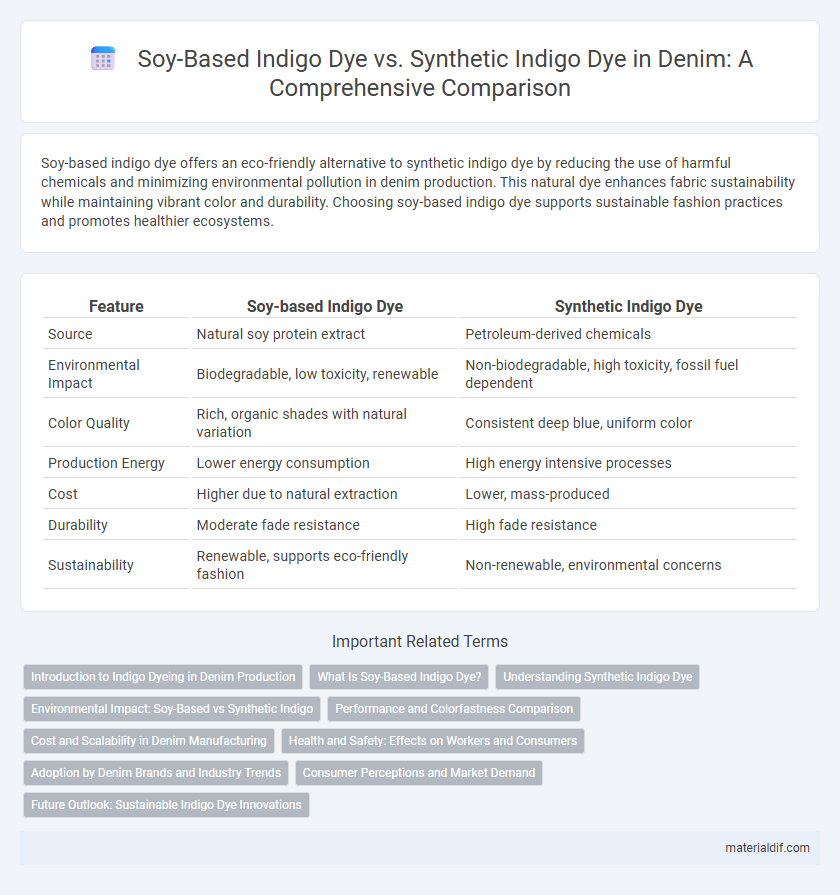Soy-based indigo dye offers an eco-friendly alternative to synthetic indigo dye by reducing the use of harmful chemicals and minimizing environmental pollution in denim production. This natural dye enhances fabric sustainability while maintaining vibrant color and durability. Choosing soy-based indigo dye supports sustainable fashion practices and promotes healthier ecosystems.
Table of Comparison
| Feature | Soy-based Indigo Dye | Synthetic Indigo Dye |
|---|---|---|
| Source | Natural soy protein extract | Petroleum-derived chemicals |
| Environmental Impact | Biodegradable, low toxicity, renewable | Non-biodegradable, high toxicity, fossil fuel dependent |
| Color Quality | Rich, organic shades with natural variation | Consistent deep blue, uniform color |
| Production Energy | Lower energy consumption | High energy intensive processes |
| Cost | Higher due to natural extraction | Lower, mass-produced |
| Durability | Moderate fade resistance | High fade resistance |
| Sustainability | Renewable, supports eco-friendly fashion | Non-renewable, environmental concerns |
Introduction to Indigo Dyeing in Denim Production
Indigo dyeing in denim production traditionally relies on synthetic indigo due to its consistent colorfastness and cost-effectiveness. Soy-based indigo dye emerges as a sustainable alternative, offering a renewable source derived from soy protein that reduces environmental impact. This bio-based dye provides comparable depth and vibrancy while promoting eco-friendly practices in denim manufacturing.
What Is Soy-Based Indigo Dye?
Soy-based indigo dye is a sustainable alternative to traditional synthetic indigo dye, derived from natural soy protein sources that reduce environmental impact during production. Unlike synthetic indigo, which relies on petrochemicals and generates hazardous waste, soy-based dyes offer biodegradability and lower carbon emissions. This innovative dyeing method enhances eco-friendly denim manufacturing by preserving fabric quality while minimizing chemical pollutants.
Understanding Synthetic Indigo Dye
Synthetic indigo dye, chemically derived through aniline-based processes, offers consistent colorfastness and scalability compared to natural alternatives. This dye is favored in denim manufacturing for its vibrant blue hues and resistance to fading, enabling mass production with uniform quality. Despite environmental concerns linked to its chemical synthesis, synthetic indigo remains the dominant choice for achieving classic denim aesthetics.
Environmental Impact: Soy-Based vs Synthetic Indigo
Soy-based indigo dye significantly reduces environmental footprints by using renewable soy proteins and minimizing toxic effluents compared to synthetic indigo dyes, which rely on petroleum-based chemicals and generate hazardous waste. The biodegradability of soy-based dyes leads to less water pollution and lower carbon emissions during production and disposal. Transitioning to soy-based indigo dye supports sustainable denim manufacturing by lowering ecological damage and promoting circular economy practices.
Performance and Colorfastness Comparison
Soy-based indigo dye offers eco-friendly advantages with comparable initial color vibrancy to synthetic indigo, but synthetic indigo outperforms in long-term colorfastness and resistance to washing and fading in denim fabrics. Performance tests reveal synthetic indigo maintains deeper hues after multiple washes, while soy-based dye may show slight fading due to natural pigment breakdown. The trade-off between sustainability and durability is critical for manufacturers prioritizing either environmental impact or extended garment lifespan in denim production.
Cost and Scalability in Denim Manufacturing
Soy-based indigo dye offers a sustainable alternative to synthetic indigo with lower environmental impact but currently faces higher production costs and limited scalability in denim manufacturing. Synthetic indigo dye remains dominant due to its cost-effectiveness, consistent quality, and established large-scale supply chain, enabling mass production of denim at competitive prices. Increasing investment in soy-based dye technology and supply infrastructure is essential to achieve scalability and reduce costs for widespread adoption in the denim industry.
Health and Safety: Effects on Workers and Consumers
Soy-based indigo dye offers a significant health advantage over synthetic indigo dye due to its natural, non-toxic composition, reducing skin irritation and respiratory issues among denim factory workers. Synthetic indigo dye contains hazardous chemicals like aniline and formaldehyde, which pose health risks such as dermatitis and long-term exposure toxicity. Consumers benefit from soy-based dyes with fewer allergic reactions and chemical residues, promoting safer, eco-friendly denim products.
Adoption by Denim Brands and Industry Trends
Denim brands are increasingly adopting soy-based indigo dye due to its sustainable and eco-friendly properties, aligning with growing consumer demand for environmentally responsible fashion. Major denim manufacturers report improved biodegradability and reduced chemical waste with soy-based dyes compared to synthetic indigo, facilitating compliance with stricter environmental regulations. Industry trends indicate a rising investment in soy-based dye technology as brands aim to minimize their carbon footprint while maintaining rich, vibrant denim coloration.
Consumer Perceptions and Market Demand
Consumers increasingly favor soy-based indigo dye for denim due to its eco-friendly attributes, perceiving it as a sustainable alternative to synthetic indigo dye, which is often criticized for its environmental impact. Market demand for denim products dyed with soy-based indigo is rising, driven by growing awareness of chemical use and sustainability in fashion. Brands adopting soy-based dyeing methods report enhanced consumer loyalty and opportunities in the green apparel sector.
Future Outlook: Sustainable Indigo Dye Innovations
Soy-based indigo dye presents a promising alternative to synthetic indigo by significantly reducing environmental impact through renewable, biodegradable sources and lower chemical usage. Research in sustainable indigo dye innovations is focusing on enhancing colorfastness and scalability to meet industrial demands while minimizing water and energy consumption. Future developments aim to integrate biotechnological advances and circular economy principles, positioning soy-based dyes as a key driver in the sustainable transformation of denim manufacturing.
soy-based indigo dye vs synthetic indigo dye Infographic

 materialdif.com
materialdif.com